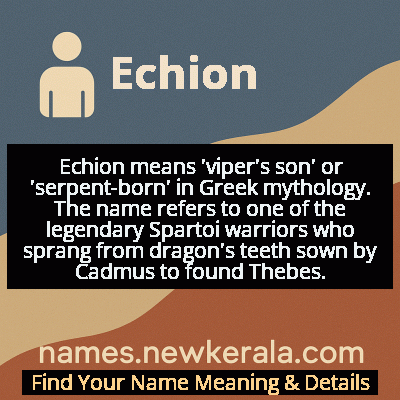Echion Name Meaning & Details
Origin, Popularity, Numerology Analysis & Name Meaning of Echion
Discover the origin, meaning, and cultural significance of the name ECHION. Delve into its historical roots and explore the lasting impact it has had on communities and traditions.
Name
Echion
Gender
Male
Origin
Greek
Lucky Number
9
Meaning of the Name - Echion
Echion means 'viper's son' or 'serpent-born' in Greek mythology. The name refers to one of the legendary Spartoi warriors who sprang from dragon's teeth sown by Cadmus to found Thebes.
Echion - Complete Numerology Analysis
Your Numerology Number
Based on Pythagorean Numerology System
Ruling Planet
Mars
Positive Nature
Generous, passionate, energetic, and humanitarian.
Negative Traits
Impulsive, impatient, moody, and can be overly emotional.
Lucky Colours
Red, maroon, scarlet.
Lucky Days
Tuesday.
Lucky Stones
Red coral, garnet.
Harmony Numbers
1, 2, 3, 6.
Best Suited Professions
Military, sports, philanthropy, leadership roles.
What People Like About You
Courage, energy, leadership, generosity.
Famous People Named Echion
Echion of Thebes
Mythological Warrior
Surviving Spartoi who helped build Thebes and fathered King Pentheus
Echion the Argonaut
Mythological Hero
Crew member on Jason's ship Argo during the quest for Golden Fleece
Echion (Vase Painter)
Ancient Artist
5th century BCE Athenian vase painter known for red-figure pottery
Name Variations & International Equivalents
Click on blue names to explore their detailed meanings. Gray names with will be available soon.
Cultural & Historical Significance
Extended Personality Analysis
The name Echion evokes personality traits rooted in its mythological origins as one of the earth-born Spartoi. Individuals with this name are often perceived as possessing innate strength, resilience, and a warrior spirit—qualities necessary to survive the immediate combat that characterized the Spartoi's emergence. They tend to be natural leaders in challenging situations, displaying courage and strategic thinking when faced with conflict. The serpent symbolism in the name's meaning suggests someone with deep wisdom, transformative capabilities, and perhaps a mysterious or complex inner nature. However, this mythological background also suggests potential challenges: the volatility of earth-born energy, a tendency toward fierce independence, and the burden of a dramatic heritage. Like the original Echion who helped build Thebes from violent beginnings, these individuals often show remarkable capacity for turning chaotic situations into structured achievements. They typically possess strong protective instincts, loyalty to their chosen communities, and a pioneering spirit that drives them to establish new foundations rather than follow existing paths. The tragic elements of the Theban royal family story associated with Echion suggest that these individuals may face complex moral dilemmas and dramatic life circumstances that test their character and resilience.
Modern Usage & Popularity
In contemporary naming practices, Echion remains an extraordinarily rare choice, primarily confined to academic circles, mythology enthusiasts, and families with strong connections to Greek heritage. The name has never achieved mainstream popularity and does not appear in modern baby name databases or rankings. Its usage is almost exclusively intentional and scholarly, chosen by parents seeking to honor Greek mythological traditions or make a statement about classical education. The name's complexity, strong mythological associations, and connection to tragic Theban legends make it a challenging choice for everyday use. However, it occasionally appears in historical fiction, fantasy literature, and academic contexts as a character name or reference. The trend toward unique mythological names has brought some attention to Echion, but its specific connection to violent origins and tragic family sagas likely limits its broader appeal. It serves more as a cultural reference point than a practical naming option in most contemporary societies.
Symbolic & Spiritual Meanings
Symbolically, Echion represents the profound Greek concept of physis—the inherent nature of things emerging from the earth itself. As one who sprang from dragon's teeth sown in the soil, Echion symbolizes the raw, untamed power of the earth giving birth to civilization. The dragon's teeth imagery connects to themes of latent potential, hidden dangers, and the unexpected consequences of human (or divine) actions. The transformation from tooth to warrior to city-builder represents the alchemical process of turning base elements into noble achievements. Serpent symbolism permeates the name's meaning, evoking the dual nature of snakes in Greek thought: representing both healing wisdom (as with Asclepius) and deadly danger. Echion thus embodies the paradox of civilization itself—born from violence, sustained by cooperation, and perpetually balanced between order and chaos. The name carries the weight of foundation myths, reminding us that even the most sophisticated societies have primal, earth-born origins, and that the seeds of destruction often accompany the beginnings of creation.

